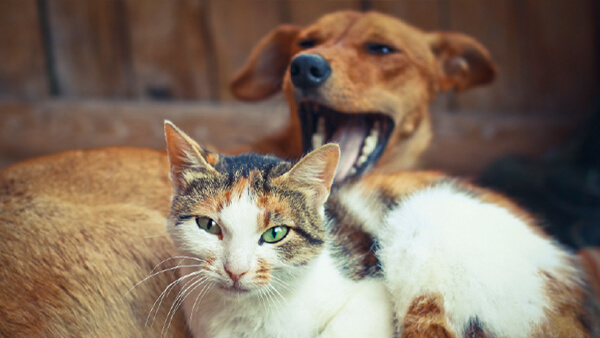
My pet’s teeth look clean on visual inspection. Does that mean they don’t have periodontal disease?
It’s not possible to fully assess periodontal disease by simply looking in a pet’s mouth. Some of the damage can only be seen by a vet during a full mouth examination with the pet under general anaesthesia.1
Therefore, even if your pet’s teeth look clean, you can’t be sure that they don’t have periodontal disease. Speak to your vet for individual advice.
What are the first signs of periodontal disease?
The first sign of periodontal disease is usually bad breath, which is caused by bacterial build-up in your pet’s mouth.
As the disease progresses, other symptoms can appear, including:
- Eating and drinking abnormally
- Having a strong or unusual reaction to drinking cold water
- Developing a selective appetite (e.g. preferring soft foods)
- Lack of appetite and weight loss
- Rubbing the feet on the face or shaking the head
- Abnormal aggressive behaviour
Is bad breath normal in pets?
No – a healthy mouth shouldn’t have bad breath.
Bad breath is caused by chemicals produced by the bacteria associated with periodontal disease. Although most pet owners think bad breath is just a cosmetic problem, research shows that even small amounts of these chemicals are harmful to tissues and play a role in the development of periodontal disease.2
Is toothbrushing really that much more effective than dental food/chews?
Yes – brushing daily has been shown to be over three times more effective at controlling plaque compared to a daily dental chew or dental diet.3
Should I brush my pet’s teeth every day?
The more often you brush your pet’s teeth, the more effective it is. One study found that toothbrushing decreases plaque by 37% if done daily, 25% if done every other day, and 10% if done weekly.4
Even if you don’t manage to brush your pet’s teeth every day, it will still have some effect, especially if you combine it with other products like water additives on days you don’t brush.
References
1. Bellows J et al. 2019 AAHA Dental Care Guidelines for Dogs and Cats. J Am Anim Hosp Assoc 2019;55(2):49–69. 2. Mateo A et al. Evaluation of efficacy of a dental chew to reduce gingivitis, dental plaque, calculus, and halitosis in toy breed dogs. J Vet Dent 2020;37(1):22–28. 3. Allan RM et al. Prospective randomised blinded clinical trial assessing effectiveness of three dental plaque control methods in dogs. J Small Anim Pract 2019;60(4):212–217. 4. Harvey C et al. Effect of frequency of brushing teeth on plaque and calculus accumulation, and gingivitis in dogs. J Vet Dent 2015;32(1):16–21.

